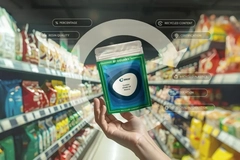Cruz Foam secures Series A funding to scale chitin-based packaging commercialization

31 Oct 2022 --- Cruz Foam, a start-up based in California, US, has received US$18 million in a Series A funding round led by the social problem-solving company Helena. The producer of chitin-based packaging will use the money to develop and manufacture its zero-plastic foam solution.
The startup designs circular materials from bio-based replacements for single-use plastic as companies and legislators call for decreased plastic packaging. The funding round was joined by companies One Small Planet, Regeneration.VC, At One Ventures and SoundWaves.
Chintin – Cruz Foams’ primary material – is harvested from the shells of crustaceans including crabs, shrimp, lobsters and some land insects. It is solid and biodegradable while being supplied in large quantities with piles produced outside every seafood processing plant.

“Cruz Foam’s Series A will allow us to accelerate and scale the commercialization of our circular materials to respond to the urgent market demand,” says John Felts, CEO and co-founder of Cruz Foam.
 The startup tests its crustacean-derived biodegradable foam solution with new prototypes. Scaling the crustacean foam
The startup tests its crustacean-derived biodegradable foam solution with new prototypes. Scaling the crustacean foam
A majority of the funding will go toward scaling the production of Cruz Foams materials with existing industries. The company hopes this will catalyze the transition of global supply chains away from harmful single-use materials for protective packaging and other uses.
The company is also raising such a large sum of money because it needs to create a high-functioning prototype to test the possibilities of the product.
PackagingInisights previously spoke to Felts about the company’s scalability, saying it is essential to understand how the material “can be adaptable to suit multiple pathways for its use and disposal,” which is to be investigated with the new funding.
Felt has also stated that Cruz Foam is in talks with several of the largest manufacturers of packaging foam to make chitin-based materials. Cruz Foam never planned on performing the manufacturing itself. Currently, it does not have a fraction of the machines it would need to meet demand, another use of the funding being expansion.
Foam to reduce plastic
The first line of products created from the funding will target plastic foam, as the company has started its mission to replace single-use, petroleum-based plastics starting with replacements for expanded PS and expanded PE foam.
Cruz Foam’s products’ ingredients are derived from all naturally occurring food waste materials. Cruz Foam was developed “to provide protection and performance but without adverse environmental impacts.”
“Petroleum-based products, specifically those designed for single-use, pose one of the greatest threats to our planet,” says Henry Elkus, founder of Helena.
With the new investment, Cruz Foam also looks to move into new spaces such as cold chain and primary packaging for consumer packaged goods.
Biodegradable packaging growth Cruz Foam plans to use the US$18 million investment for manufacturing and scalability.
Cruz Foam plans to use the US$18 million investment for manufacturing and scalability.
Funding for eco-friendly solutions such as Cruz Foam’s biodegradable packaging is in line with market projections. According to the company, the “environmentally sustainable” packaging market is expected to grow to US$358 billion by 2028.
“Through our work and investment with partners like Cruz Foam, we’re aiming to tackle the issue in a wholly innovative way to sustain meaningful change in the packaging space,” continues Elkus.
The company also announced that it would convert to a Benefit Corporation, formalizing its longstanding commitment to creating a more sustainable planet. Cruz Foam will report annually on its progress in achieving its public benefit.
“We collaborate to deliver proactive solutions to address the preventable environmental crisis of plastic pollution. Further, our conversion to a Benefit Corporation underscores our core values and commitment to this mission,” concludes Felts.
By Sabine Waldeck












